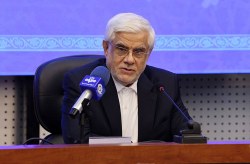According to the public relations and international affairs office of the Kish Free Zone Organization, Dr. Mohammad Reza Aref underscored the significance of free zones, particularly Kish, due to their geographical location and existing infrastructure, which positions them as potential regional hubs. He noted that these zones were established over recent decades to foster economic development and attract both domestic and foreign investment.
Dr. Aref stated that the contribution of free zones to the national economy must be clearly defined. With stable laws and long-term policies, this contribution can significantly aid the country's economic leap. He pointed out that free zones have the capacity to realize developmental slogans, given their operational freedoms in trade and facilitation of economic activities.
Addressing the legal challenges and instability of existing regulations in free zones, he remarked that one of the fundamental issues is the frequent changes in laws. While initial legislation has generally been suitable and effective, the lack of stability in its implementation has hindered long-term objectives. Therefore, legal stability and the elimination of legal conflicts are vital for achieving the missions of free zones.
Dr. Aref emphasized that realizing developmental slogans requires necessary measures, stating that merely announcing ambitious development goals is insufficient; achieving these goals necessitates coherent planning, legal stability, and integrated management.
He evaluated interaction with neighboring countries and the role of free zones in the region as crucial, noting that developing economic cooperation with neighboring nations is among the top priorities for free zones. The Eurasian and Shanghai countries present good opportunities for free zones, which necessitate more serious engagement and pragmatism in this area.
The First Vice President highlighted that free zones, especially Kish, have the potential to become regional hubs in tourism, ICT, and high-tech sectors due to their geographical position and existing infrastructure. He asserted that attracting both domestic and foreign investors is one of the most important issues for the new year, stressing the need for planning to identify and attract interested investors, especially as regional competitors are vying for investment opportunities.
In conclusion, Dr. Aref noted that in a competitive environment, Iranian free zones must leverage their distinct advantages such as supportive regulations, advanced infrastructure, and strategic geographical locations. He also mentioned that focusing on advanced investment in modern technologies could play a significant role in achieving an 8% economic growth rate. Free zones should become platforms for private sector participation and investment in high-tech industries, digital technologies, and health technology.
He pointed out the unique advantages of Kish Island compared to other free zones in the country, asserting that the perception of Kish should be framed differently since this area can lead among other free zones due to its special characteristics.
The meeting underscored that free zones play a key role in the country’s economic leap and overcoming challenges posed by sanctions. Attendees emphasized that with stabilized regulations, attracting domestic and foreign investments, and utilizing existing infrastructure, these zones could become a driving force for economic growth, technological development, and international interactions. Economic activists reiterated that Kish Island should be recognized as a successful model of a free zone at both national and regional levels.
